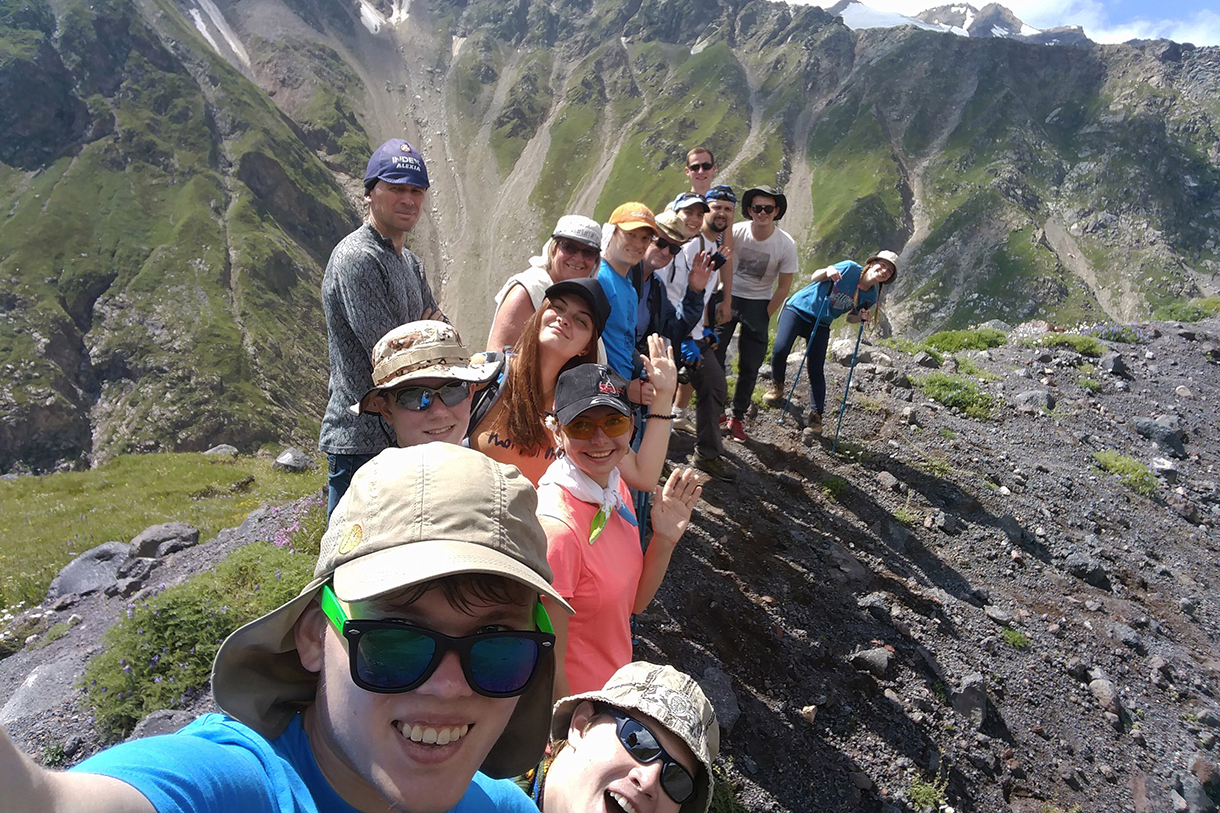HSE Team Conquers Mount Elbrus for Fourth Time
.jpg)
Members of HSE’s Extreme Sports Club again reached the top of Russia and Europe’s highest peak on Mount Elbrus in August of this year. All participants in this ascent received the title of ‘Alpinist of Russia’. Below we present a diary of their trip, covering such topics as a thunderous snowstorm during their ascent, eating lunch at Yury Vizbor’s favorite café and much more.
Day 1
On the first day, our trip led to Cheget Meadow. After reaching the most extreme point (‘extreme’ since our club doesn’t use the word ‘last’) of civilization in the small town of Tyrnauz, we arrived at Prielbrusie. That evening we made our first high-speed acclimatization ascent on Mount Cheget under heavy rain.
Rain and snow are the main enemies of mountain-climbers. Despite this, we were able to go up 300 meters and get a view of Prielbrusie’s magnificent panorama. After coming back down, we had dinner and went right to bed, as Day 2 promised us a real acclimatization ascent at Terskol Gorge.
HSE students and graduates: Tatiana Bokova, Svetlana Kudinova, Anna Lopakova, Maxim Bondarev, Vladislav Matyushonok, Egor Sokolev, Vitaly Silchiev, Alyona Bodanova, Marat Saakian, Ivan Sorokin, Ksenia Chudayeva, Andrey Schyekotov, as well as Professor Dmitry Lopatnikov (of HSE’s School of Public Administration) and visiting Austrian student Roxanna Schmidt.
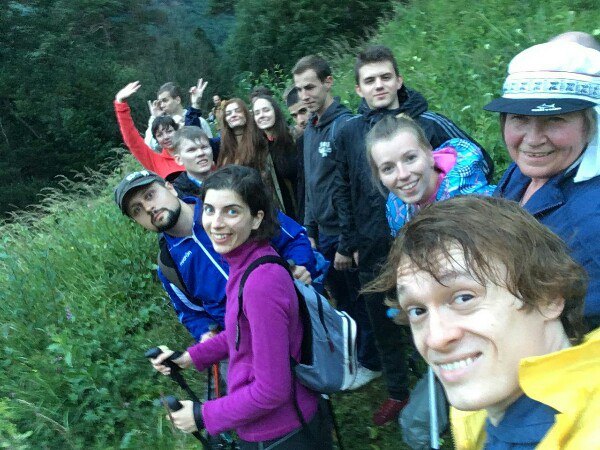
Day 2
We weren’t blessed with the best weather on the second day but, nonetheless, having overcome all hardships, we made our way to Terskol Gorge. Much like Day 1, the climb came to around 300 meters. However, since everybody stopped to take pictures, it took us around three hours to reach our destination. The road to the gorge was quite sunken and many of us had their ‘super-cool’ boots soaked right through, even though they were supposed to last until the end of the world as promised by the salespeople. Instead, this turned out not to be the case. Nonetheless, the view of the waterfall before us was worth all the soaked boots and slight exhaustion. We didn’t go all the way to the waterfall since mountain rivers can be even more turbulent when there’s rain. Furthermore, we didn’t want to use up too much energy and risk not reaching our final goal – the summit.
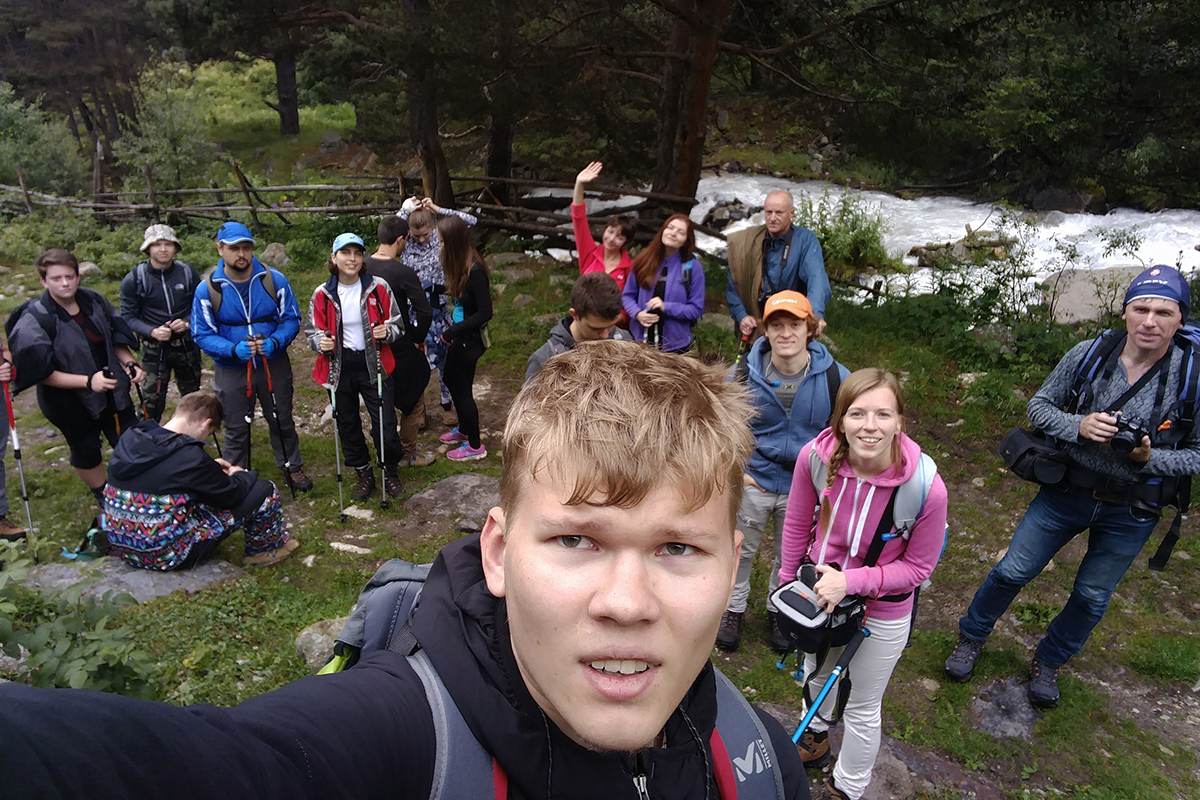
Day 3
The third day promised to be even more of a challenge as our climb came to 1,300 meters! The end point of our journey was a lake near to the Krugozor cableway station. In fact, this lake was nothing more than a dirty puddle, which, nonetheless, served as our key navigational guide. The ascent was no less difficult than our descent. Altitude sickness occurs when, on an ascent, one may experience a state of euphoria and has a hard time seriously grasping what’s going on around them. This euphoria is often the first stage of altitude sickness. Still, everything becomes clear if you fall on a descent. In fact, around 80% of climbing accidents on Elbrus happen while people are going down the mountain.
Throughout the world, alpine descents on chairlifts are almost always free. Therefore, it isn’t totally unimportant how you get up since you always have to make a descent. However, unfortunately, this rule doesn’t always apply in the Caucasus.
Day 4
On the fourth day, we made our way to the Terskolak icecap and Devichi Kosy waterfall. Our route took us through both forests and impressive mountains. It was very interesting to see how the nature changed as we move up further. We first made it up to the waterfall and had a great time there: people went swimming and sunbathed. Nevertheless, in an hour or so, we had to pack up as we had to continue further to the icecap. Day 4’s climb came to around 1,300 meters. After a brief rest, we finally reached our destination. Everybody was quite emotional, especially when they had a chance to tobogganing in August!
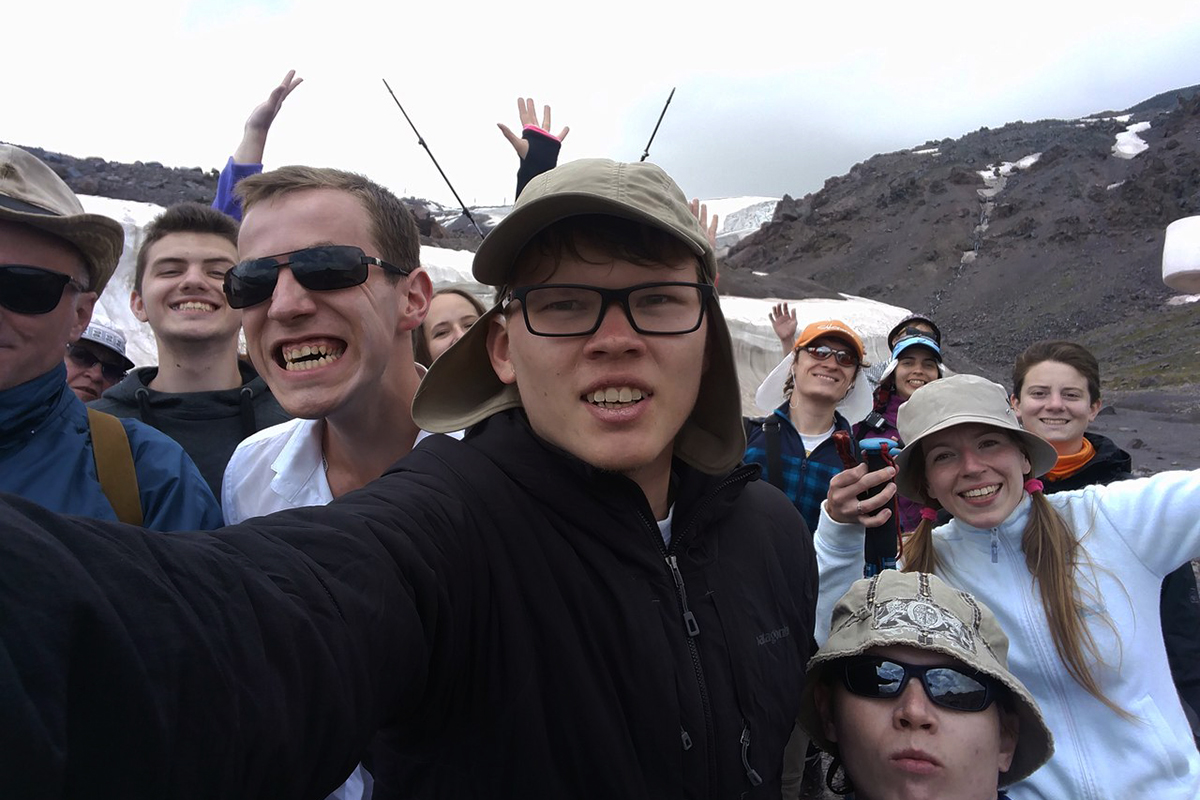
Day 5
On this day, we climbed Mount Azau Gitche Cheget Gora (at an altitude of 3,461 meters). Part of our group took the established route, but some of our more adventurous and daring climbed up via Donguzorun Lake. For their efforts, they were awarded with lunch at the legendary Ai Café. The famed poet Yury Vizbor particularly liked to frequent this café. In fact, several films were made here such as Breakfast with a View on Elbrus.

After spending around 2 hours on the summit, we decide to make our way back down as thunder could be heard from the Georgian border.
We used the following day to distribute and check our provisions.

Days 7 and 8
After packing our knapsacks, we headed to Priyut 11 (the final overnight stop before tackling the summit). The evening was relatively warm and light. Upon taking stock of the weather forecast, we decide to make our move in the wee hours of the morning. We left at 1:30am and the weather was still excellent. For instance, even around midnight, the summit was already visible.
Around 3am, the weather was getting worse and a snowstorm started brewing. Still, it was nice that we decided continue our way and suddenly had a chance lay ‘down the line’.
At 4:30am, lightning struck just a few meters from us. So, we quickly decided to make a descent. Unfortunately, we weren’t able to see the dawn from a high altitude.
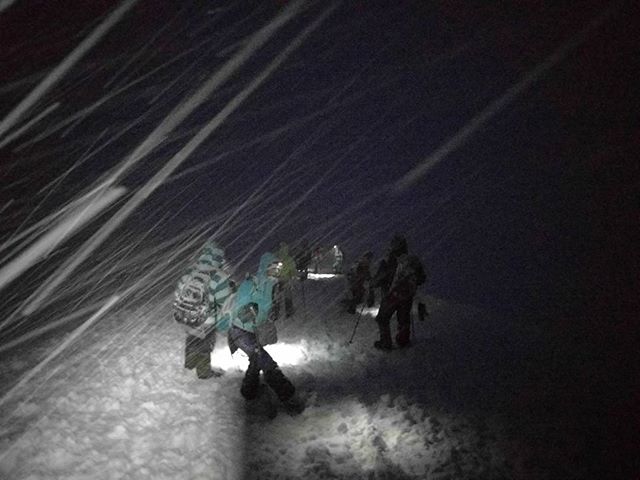
At 6:30am, it was clear that we would have to stop for the next 60 hours as the weather wasn’t conducive for climbing. So, we sat it out at Priyut 11.
In spite of this risk, we also thought it was best to rest it out at Priyut 11 in order to acclimatize to the altitude. But we also knew a storm was on its way, so it was in our plan to reach the peak before its onset.
Days 8 and 9
The snowstorm continued for the entire day. But the atmosphere at Priyut 11 was warm and positive, where we could have hot tea and had access to reading lights. We also played mafia, dominoes and card games. Unfortunately, the meteorologists at Snow Forecast said that the weather wouldn’t turn out in our favour. As it goes, HSE’s Extreme Sports Club is a place for unbreakable optimists.
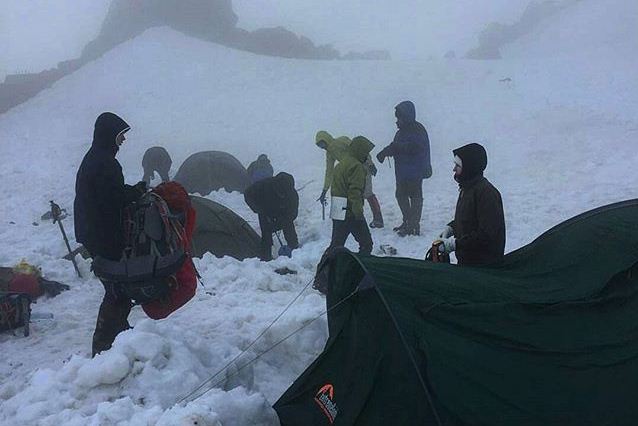
Day 10
By Day 10, the weather cleared up much to our delight! We set out around 1am and were already at the Plastukhov cliffs by around 4am. In fact, the weather forecast wasn’t that great, and we were likely to encounter wind in soaked boots.
Nonetheless, at 11:15am we were at the summit, at an altitude of 5,642 meters.
Furthermore, this was the fourth successful attempt to conquer Europe’s highest peak by members of HSE’s Extreme Sports Club.
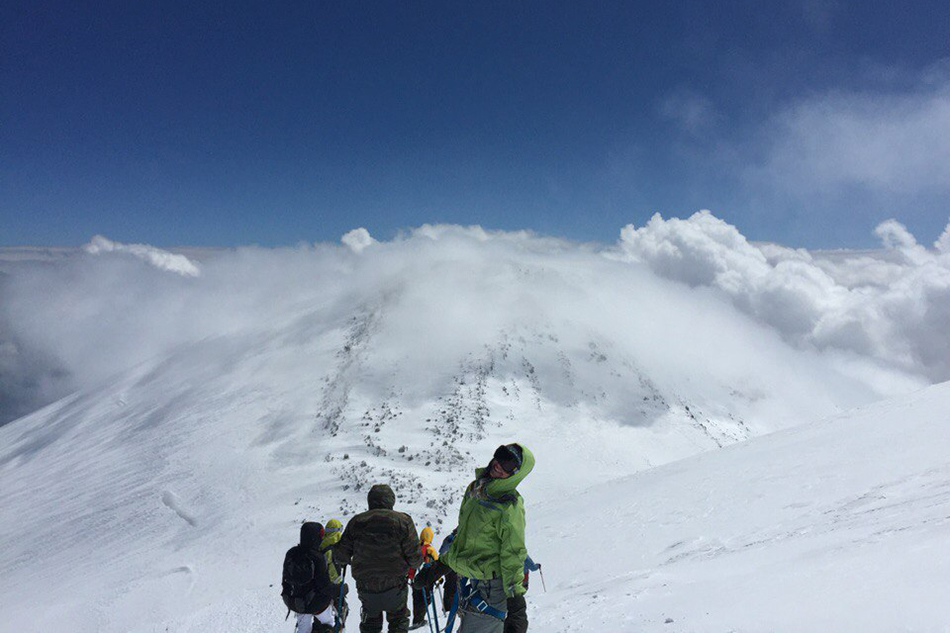
HSE’s Extreme Sports Club is indebted to the University’s Physical Education Department for its support of the expedition.
For over 16 years, HSE’s Extreme Sports Club has been organizing joint trips and expeditions for students and staff of the University, as well as their friends and families. It also is active in organizing winter and summer sporting events and tournaments. Membership in the club can open a whole new world with interesting people and the opportunity to visit the most beautiful places on earth. Information on the club’s upcoming events is regularly posted on its page on Vkontakte.
Text: Andrey Schekotov, student at HSE MIEM
Photos: Marat Saakian and Andrey Schyekotov
See also:
HSE University Participates in Youth Hiking Tourism Development Strategy
HSE University and the project team of ‘Hikes of the First—More than a Trip’ are working on a strategy to promote hiking tourism among young people through 2030. At the HSE University project session, honoured travellers of Russia, trail builders, and representatives from various institutions, such as HSE University and the Ministry of Natural Resources and Environment of Russia, came together to work on proposals. For three years, university experts were designing mechanisms for creating the infrastructure for hiking tourism, taking into account safety standards, eco-friendliness, and professional training for guides.
Wild Travel Festival Dazzles with Hitchhiking, Volunteerism, and Dance
How can you live in Europe a whole year without spending a single euro? Is it safe to travel alone? Do you need to learn the local language of your destination if you know English? At HSE’s Cultural Centre on January 25, guests could get answers to all their burning questions about independent and off-the-beaten-path travel at the Wild Travel Festival.
‘Our Curriculum Meets the Challenges of the Business Environment’
The HSE master's programme 'Experience Economy: Hospitality Management and Tourism' offers knowledge which is required in business, but not yet widely available in textbooks. Marina Predvoditeleva, Academic Supervisor of the programme, speaks about the innovations that will be introduced to the programme curriculum in the next academic year.
What Russians Tell Tourists about their Towns
Residents of provincial Russian towns put it differently when talking about their towns to Muscovites, foreigners, and tourists from other Russian regions. Such an ‘individual approach’ is spontaneous and may be useful in creating city tourist brands, concluded Nadezhda Radina as a result of her experiment, which involved over 800 residents of Russian provinces.
'My Heart Is in the Mountains'
Elena Koleva was born in Sofia, Bulgaria, and studies psychology at HSE. She not only masters the depths of psychology, but also actively participates in the HSE Extreme Sports Club. Elena says this club and its activities were one of the decisive factors in her choosing to study at HSE.
'We Want to Show Our Guests All the Best Russia Has to Offer'
For many foreigners, Russia is still considered a region of extreme tourism. HSE graduates Anastasia Efimova and Alexei Chichvarin opened up the Brick Design Hotel on Myasnitskaya Street not only as a business, but also as a project aimed at changing the stereotypes that tourists have about Russia. In the latest edition of Success Builder, Anastasia and Alexei talk about how easy it was for them to start a business after graduating from HSE, what is complicated about reconstructing a historic landmark, why foreigners like farm products for breakfast, and how to benefit during times of crisis.
HSE Students Invite Everyone on a Trip
The first ‘I Like Trip’ festival was held at HSE Media courtyard, 2/8 Khitrovsky Pereulok. During the day, visitors had the chance to sample national dishes cooked by HSE students from all over the world, learn folk dances (and other kinds of dance), find the job of your dreams in tourism at the careers fair, and get some inspiration from open yoga classes. You could also choose how to spend this summer with the student travel club ‘I Like Trip’ or HSE Tourism Club.
An Excursion to the Sky
In July, students from the HSE Extreme Sports Club planted the university’s flag at the top of Mount Elbrus, one of the world’s highest peaks. Garry Rutberg, one of the club’s leaders, and Alexandra Oleinikova, an HSE alumna and the club’s guide, tell us about the complicated nature of the mountain, ways of fighting hypoxia, and what it’s like to walk amongst the clouds.
Will Tourism Survive in a Changing World?
The international graduate student conference organized by the Master's Programme in Experience Economy, ‘Sustainable Tourism Development in the Changing World’ which took place from February 5-6 at HSE St. Petersburg, was a forum for the discussion of new approaches in researching the tourism and hospitality industries for young researchers from St. Petersburg, Moscow, Arkhangelsk, Petrozavodsk, and South Korea.
‘Our Programme Turns Tourism Lovers into Professionals’
Professor Valery Gordin, Head of the Faculty of Economics and Management at HSE St Petersburg, presents the Master’s Programme The Experience Economy; Hospitality and Tourism Management. He is academic supervisor of the course which comes under the Events Management and Cultural Tourism field of study at HSE St Petersburg. Teaching is in Russian and English.


